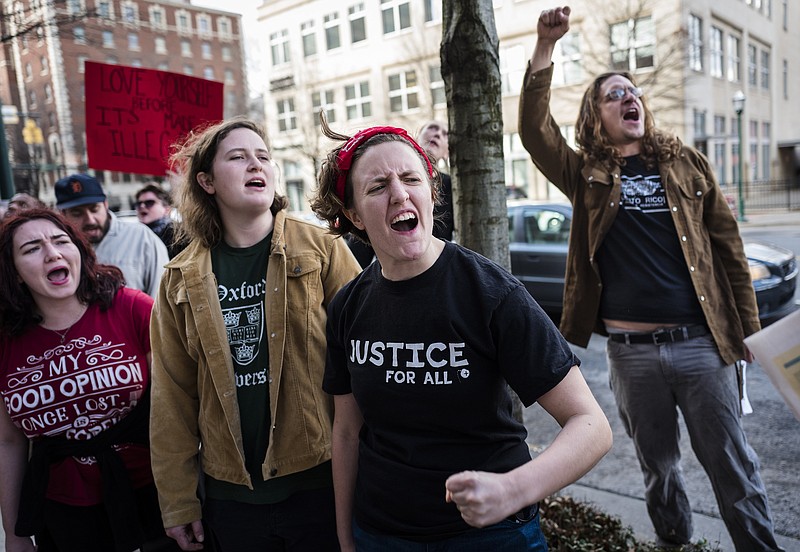A local watchdog group is renewing its call for a community oversight board that would allow citizens to investigate alleged police misconduct after the city of Nashville recently voted to create such an entity.
"The Chattanooga Police Department is currently allowed to oversee [itself] through Internal Affairs, and [has] consistently failed to discipline or fire its violent ... and dishonest officers who patrol the streets," Concerned Citizens for Justice, an activist group, said in a statement Tuesday. "This is not what democracy looks like. Community members, especially those directly impacted by police violence and misconduct, must be directly involved in the process of holding police accountable."
The group's announcement, a request it has been making for many years, follows last week's successful grassroots effort by black activists in Nashville to establish an 11-person oversight board that has the authority to investigate alleged officer misconduct with subpoenas and to help mediate conflicts and recommend punishments. Though Tennessee House Majority Leader Glen Casada, R-Franklin, has said he's looking into whether he will introduce legislation in 2019 to pre-empt the board, advocates of the board say it's a necessary avenue for citizens who want to feel confident their complaints are addressed by people not just in law enforcement.
When Chattanooga Police Department officers are accused of misconduct, either by citizens or by their colleagues, an investigator from the department's internal affairs division looks into the factual basis and makes a finding. Of the 40 internal investigations from 2017, 20 resulted in suspensions, two resulted in terminations, and three people resigned under investigation, according to city statistics. The 2016 numbers are comparable.
Police spokeswoman Elisa Myzal said Tuesday civilians have input throughout the investigative process.
"An oversight committee is currently in place for the Chattanooga Police Department," she wrote in an email, referring to the Administrative Review Committee. That's a seven-person committee made up of three civilians, three police officers and an assistant chief of police that meets when "a sufficient number of cases are pending," reviews internal investigations and makes recommendations to the chief. The group has been around "many years," Myzal wrote in an email.
Asked whether he supported an oversight board, Chattanooga Mayor Andy Berke said the existing policies, including the Administrative Review Committee, "already provide important measures of accountability and transparency." Berke added he welcomed any suggestions about how to create more accountability for officers and cited the work done by former police Chief Fred Fletcher and current Chief David Roddy to fire and decertify certain officers accused of misconduct.
Concerned Citizens for Justice, however, said the Administrative Review Committee isn't enough; the seven-person board is majority law enforcement and doesn't reflect the voices of the community. Under Nashville's new setup, current law enforcement cannot sit on the board - only those who've been retired for five years or more. Furthermore, seven of the 11 people will be nominated by community organizations. And four of those seven "must reside in economically distressed communities," according to the amendment to create the oversight board. The city council and mayor's office, meanwhile, handles the other four appointments.
"[Chattanooga's current review committee] consists mostly of police officers," Concerned Citizens for Justice wrote in its statement. "The committee's decisions are only advisory in role, and have no real power to discipline officers or to set up and/or change policies."
Citizens and Chattanooga officials have debated about oversight boards since at least the 1990s, according to Times Free Press archives, public court documents and news reports. In 1998, Lorenzo Ervin, Damon McGee and Mikail Musa Muhammad were arrested during a city council meeting for protesting a pair of recent fatal shootings by law enforcement. The next year, a citizens panel was created to help review internal investigations.
But that panel, also referred to as the Administrative Review Committee in archives, struggled. According to a 2009 Times Free Press article, it had three vacancies and didn't meet regularly. The city council appointed a person from each district to that panel, and the police department was responsible for alerting council members to any vacancies, the article says. In a 2013 Times Free Press editorial, a 14-year member of the city's Administrative Review Board said the board rarely dissented and added no person of color had sat on it.
Nationwide, many cities are creating some version of an oversight committee, including Knoxville and now Nashville, said Liana Perez, director of operations at the National Association of Police Oversight of Law Enforcement. Each one is different and reflects whatever relationship works best for that particular city, said Perez, who added that in Tucson, Arizona, where she works, an oversight board only has law enforcement personnel serve in an advisory capacity - they don't have a vote.
In return, the oversight board doesn't investigative authority, or have the ability to subpoena someone to appear before it for questioning.
"However, the chief has created more of an internal forum where we can review uses of force that aren't necessarily coming from complaints, but are coming from officers who have to document them," she said.
Contact staff writer Zack Peterson at zpeterson@timesfreepress.com or 423-757-6347. Follow him on Twitter @zackpeterson918.
